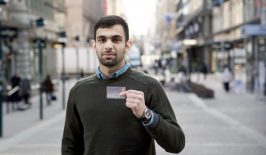There’s a term for someone who doesn’t have a personal record of any kind regarding their economic status: unbanked.
We’ve written before about how this is often a problem for migrants and refugees in countries where financial support relies on an established record, via paperwork and bank accounts. In many European countries, registering your address is a mandatory requirement before a person can open a bank account. Without paperwork to obtain residency, obtaining a legal job is difficult.
In many societies this is normal – as many as 2.5 billion people are classified as unbanked. Those in remote and rural areas of low-income countries may have never had the need to save money or obtain a loan to start a venture. But having some kind of verifiable record of transactions is a prerequisite for being able to establish proof of being solvent.
We’ve written before about a Finnish government attempt via blockchain to help refugees arriving to the country without any records. The Finnish Immigration Service Migri partnered with Helsinki-based blockchain startup MONI, where prepaid Mastercards track transactions. This provides a way to both receive money, find employment, and pay for services online, and become established in society. Fummi offers a similiar service for the homeless.
Another blockchain-based company, BanQu, is attempting a similar idea on a larger scaler, aiming to help the wider unbanked. Up to 60 per cent of people in these societies own a smartphone, and BanQu aims to provide a service to create secure and verified IDs to help the world’s vulnerable establish a kind of economic passport. Founder Hamse Warfa, who was born in Somalia and is now based in the U.S., told PBS Radio, “We want bring dignity through identity by making sure that everyone is entitled and owns their own data.”
Blockchain tokens establish the record that can’t be modified and is private to the user unless shared.
Is it viable?
BanQu is pretty strong on pushing the quality and value of their product. But there are more than a few problems. The first is that BanQu is a little hard to track down. Despite existing for more than two-and-a-half years, the BanQu app curiously isn’t currently available to download. The company is active on social media and in industry and appears to be angling towards supporting institutions with their technology in a business-to-business approach, rather than business-to-consumer. In short, the company is still attempting to create social change, but perhaps no longer directly to consumers via an app, but via a technology platform.
The other underlying issue is that the project is on the Ethereum blockchain. While this has nothing to do with the ups and downs of the Ether cryptocurrency, Ethereum isn’t yet up to scratch for processing large numbers of transactions and scaling as well as processing costs (known as ‘gas’) are important issues.
Introducing even just several thousand users to BanQu will add additional transactions and has the potential to slow the Ethereum network further: it can only handle around 15 transactions per second. Ethereum developers, including creator Vitalik Buterin, are working towards an end goal of 1 million transactions per second, but this is a matter of wait-and-see for now. Overall, blockchain provides (even via Etherum) vastly reduced operational costs when compared to cloud hosting a private platform via a provider like AWS or Google Cloud, but limits facing all blockchain projects may be reached.
In all, BanQu offers significant hope, and we wait to see if it can work in reality. The unbanked space is attractive – somewhat obscenely – to many corporations, with PayPal just one major company offering their own services as well.





